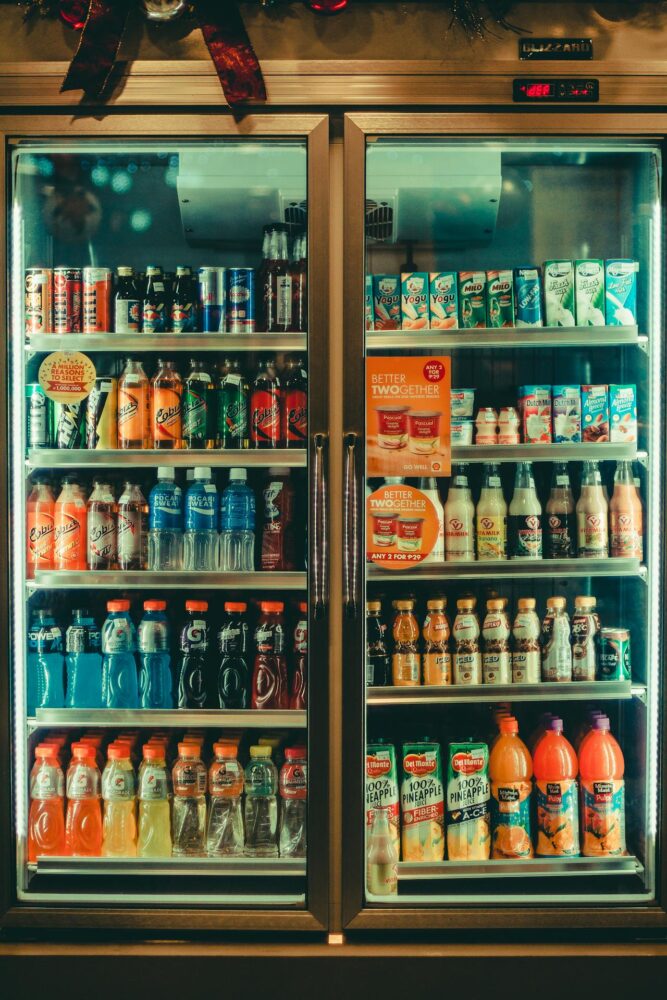Drinking Water vs. Other Beverages

Every sip matters. What you drink can shape your health, and well-being. Are you making the right choice?
Why Your Drink Choice Matters
What’s in your glass right now? Is it water, soda, juice, or something else? The beverages we choose to drink every day play a big role in our overall health. They can affect our weight, energy levels, and expose us to long-term health risks.
In today’s world, we have more drink options than ever before. Stores have whole sections dedicated to different beverages. With so many choices, it can be hard to know which drinks are best for our health.

This article will look at how water compares to other popular drinks. We’ll explore what’s in these beverages and how they affect our bodies. By the end, you’ll have the information you need to make better choices about what you drink.
Water: The Essential Drink
● What’s in Water?
Water seems simple, but there’s more to it than you might think. Pure water is made of hydrogen and oxygen. But the water we drink often contains small amounts of other things:
- Minerals: Like calcium and magnesium, which can be good for your health.
- Fluoride: Naturally found in water in some areas and often added to tap water intentionally to help prevent tooth decay just like it’s added in toothpaste.
- Trace elements: Very small amounts of other substances, which can vary depending on where the water comes from.
Some bottled waters might have extra minerals added for taste or claimed health benefits.
● How Water Helps Your Body
Water is incredibly important for your body. Here’s why:
- It moves nutrients to your cells and takes waste away.
- It helps control your body temperature through sweat.
- It protects your brain and spinal cord.
- It helps break down the food you eat.
- It keeps your joints working smoothly.
Basically, water is involved in almost everything your body does.
● How Much Water Do You Need?
You might have heard that you should drink eight glasses of water a day. But the truth is, everyone’s needs are different. How much water you need depends on:
- Your body size
- How active you are
- The weather where you live
- Your overall health
- What you eat (some foods contain water too)
Instead of following a strict rule, pay attention to your body. If you feel thirsty, that’s a sign you should drink some water. You can also check your urine colour. If it’s light yellow, you’re probably drinking enough water. If it’s dark yellow, you might need to drink more.
● Where Does Drinking Water Come From?
You have several options for drinking water:
1. Tap Water: This is the water that comes from your faucet. In many places, it’s safe to drink and carefully checked for safety. It’s cheap and doesn’t create waste from bottles. But some people don’t like how it tastes or worry about what might be in it.
2. Bottled Water: You can buy this in stores. Many people think it’s cleaner than tap water, but that’s not always true. It’s easy to carry around, but the bottles can be bad for the environment. It’s also more expensive than tap water.
3. Filtered Water: This is tap water that’s been cleaned further. You can use filters at home to remove some things from the water and improve its taste. It’s a middle ground between tap and bottled water.
The best choice often depends on where you live and what you prefer.
Common Beverage Categories
Now let’s look at some other popular drinks and how they compare to water.
● Fizzy Drinks
- Sodas: These sweet, bubbly drinks come in many flavours. They often have a lot of sugar and sometimes caffeine. They can give you quick energy, but they don’t have many nutrients.
- Sparkling Water: This is water with bubbles added. Sparkling water doesn’t have sugar or calories like soda does. Some people find it more enjoyable to drink than still water.
● Fruit Drinks
- Fruit Juices: These are made from fruits and contain some vitamins. But they also have a lot of sugar, even if it’s natural sugar. They don’t have the fibre that whole fruits do.
- Smoothies: These are drinks made by blending fruits or vegetables. They can be healthier than juices because they keep more of the whole fruit. But some store-bought smoothies have added sugar.
● Hot Drinks
- Coffee: Many people drink coffee for energy. It has substances called antioxidants that might be good for health. But too much can make you jittery or have trouble sleeping.
- Tea: There are many types of tea, from green to black to herbal. Most have less caffeine than coffee. Some types of tea have health benefits.
● Sports and Energy Drinks
- Sports Drinks: These are meant to replace water and minerals lost during hard exercise. They can be helpful for long, intense workouts, but for most people, water is enough.
- Energy Drinks: These have a lot of caffeine and sugar. They can make you feel more awake quickly, but the effect doesn’t last long.
● Alcoholic Drinks
These include beer, wine, and spirits. They’re often part of social events. In small amounts, some might have health benefits. But too much can be bad for your health and can make you dehydrated. It’s usually better not to indulge at all.
● Milk and Non-Dairy Milks
- Milk: This gives you calcium, protein, and other nutrients. But some people can’t drink it or choose not to.
- Plant-based Milks: These are drinks made from plants, like soy, almond, or oat milk. They’re good for people who don’t drink dairy milk. Different types have different nutrients.
Nutritional Comparison
Let’s compare water to these other drinks to see how they stack up.
- Water: 0 calories
- Soda: About 152 calories in a can
- Fruit Juice: About 87 calories in a glass (200ml) of orange juice
- Sports Drinks: 97 calories in one small bottle
- Milk: 68-130 calories in a glass (200ml), depending on the type.
If you’re trying to manage your weight, remember that drinks other than water can add a lot of calories to your diet.
- Water: No sugar
- Soda: About 10 teaspoons in a can
- Fruit Juice: 10 teaspoons in a 350ml bottle
- Sports Drinks: 15 teaspoons in a 750ml bottle
Too much sugar can be bad for your teeth and overall health. Water is the only drink that’s always sugar-free.
Nutrients
- Water: May have some minerals, depending on the source
- Fruit Juices: High in some vitamins, especially vitamin C
- Milk: Has calcium, vitamin D, and protein
- Coffee and Tea: Have antioxidants, which might be good for health
- Sports Drinks: Have electrolytes like sodium and potassium
While some drinks have nutrients, you can usually get these from food too. Water helps your body use the nutrients from your food.
- Water: No caffeine
- Coffee: About 95 mg per cup
- Tea: 14-70 mg per cup, depending on the type
- Energy Drinks: 40-250mg per can
- Soda: Most colas have 20-50 mg per can
Caffeine can make you feel more awake, but too much can make you feel anxious or have trouble sleeping.
Protein
- Water: No protein
- Milk: 8.14 grams per cup
- Plant-based milks: 1-8 grams per cup, depending on the type
- Sports drinks and soda: Usually no protein
- Fruit juices: Very little protein
Protein is important for building and repairing body tissues. While water doesn’t provide protein, it helps your body use the protein from foods and other drinks.
Fat
- Water: No fat
- Whole milk: About 8 grams per cup
- Low-fat milk: 2-3 grams per cup
- Skim milk: Less than 1 gram per cup
- Most other drinks (like juices, sodas, teas): No fat
Fat in drinks adds calories. Some fats, like those in milk, can be part of a healthy diet. Water doesn’t have fat, which can be good if you’re watching your fat intake.
Health Benefits of Water
Water does a lot of good things for your body. Let’s look at some of the main benefits:
1. Keeping Your Body Working Well
Your body needs water for almost everything it does. Water helps:
- Move blood through your body
- Keep your muscles working
- Control your body temperature
- Get rid of waste through urine and sweat
When you drink enough water, all these things work better.
2. Managing Weight
Drinking water can help with weight in a few ways:
- It has no calories, so it doesn’t add to your daily calorie intake
- It can make you feel full, which might help you eat less
- Sometimes, thirst can feel like hunger. Drinking water might stop you from eating when you’re actually just thirsty
3. Healthy Skin
Water is important for your skin:
- It helps keep your skin moist and elastic
- It can help your skin look fresher and younger
- It might help prevent some skin problems
While drinking water isn’t a cure-all for skin issues, it does play a role in skin health.
4. Helping Digestion
Water is crucial for your digestive system:
- It helps break down food so your body can use it
- It helps prevent constipation
- It helps your body absorb nutrients from food
Drinking enough water can help keep your digestive system running smoothly.
5. Better Physical Performance
When you exercise or play sports, water is very important:
- It helps control your body temperature
- It keeps your joints moving smoothly
- It can help you perform better and for longer
- It helps prevent dehydration, which can make you feel tired and weak
Athletes and people who exercise regularly need to be especially careful to drink enough water.
6. Brain Function
Your brain needs water to work well:
- Even mild dehydration can affect your mood and ability to think clearly
- Drinking enough water might help you concentrate better
- It some cases drinking water is the antidote for some headaches
Keeping your brain hydrated can help you feel and think better throughout the day.
Potential Drawbacks of Other Beverages
While other drinks can be part of a healthy diet, they can also have some downsides if you drink too much of them:
1. Extra Sugar and Calories
Many drinks have added sugar and calories:
- Sodas, fruit juices, and sweetened teas can have a lot of sugar
- These extra calories can lead to weight gain if you drink a lot
- Too much sugar can increase your risk of type 2 diabetes and heart disease
2. Tooth Decay
Sugary and acidic drinks can harm your teeth:
- The sugar in many drinks can cause cavities
- Acidic drinks like sodas and fruit juices can wear away your tooth enamel
- Even sugar-free sodas can be bad for teeth because of their acidity
3. Caffeine Effects
Drinks with caffeine can cause problems for some people:
- Too much caffeine can make you feel anxious or jittery
- It can make it hard to sleep if you drink it late in the day
- Some people get headaches if they suddenly stop drinking caffeine
- Caffeine can be addictive for some people
4. Dehydration from Some Drinks
Not all drinks hydrate you as well as water:
- Alcoholic drinks can make you lose more water than you take in
- Drinks with caffeine might make you urinate more, though this effect is usually small
- Very sugary drinks can draw water into your digestive system, which might lead to diarrhoea
5. Nutrient Imbalances
Drinking too much of certain beverages can lead to getting too much of some nutrients:
- Too many sports drinks can give you more sodium than you need
- Drinking a lot of milk might give you more calcium than necessary
- Some fruit juices have a lot of vitamin C, and too much can cause stomach upset
Balance is vital though. While these drinks can have some benefits, it’s important not to overdo it.
Making Healthier Beverage Choices
Choosing healthier drinks can make a big difference in your overall health. Here are some ways to make better choices:
● Reading Nutrition Labels
Understanding what’s in your drink is the first step to making healthier choices:
- Look at the serving size: Some bottles contain more than one serving
- Check the calorie count: This tells you how much energy the drink provides
- Look at sugar content: Lower is generally better
- Check for added vitamins or minerals: These can be beneficial, but whole foods are often a better source
Remember, the fewer ingredients listed, often the better the choice.
● Controlling Portions
Even with healthier drinks, how much you consume matters:
- Use smaller glasses for high-calorie drinks
- Don’t refill your glass right away – wait to see if you’re still thirsty
- For alcoholic drinks, know what a standard serving looks like
- Be aware of how many servings you’re having throughout the day
Portion control can help you enjoy your favourite drinks while maintaining a balanced diet.
● Making Water More Appealing
If you find plain water boring, try these ideas to make it more interesting:
- Add slices of lemon, lime, or cucumber for flavour
- Infuse water with herbs like mint and basil
- Add some ice cubes to your water
These options can help you drink more water without adding calories or artificial ingredients.
● Gradually Reducing Sugary Drinks
Cutting back on sugary drinks can be challenging, but these steps can help:
- Start by replacing one sugary drink a day with water
- Choose smaller sizes when you do have sugary drinks
- Try unsweetened versions of your favourite drinks
Over time, you may find that you prefer less sweet drinks.
● Choosing Whole Fruits Over Fruit Juices
Whole fruits are often a healthier choice than fruit juices:
- They contain fibre, which juice often lacks
- You’re likely to consume fewer calories eating a fruit than drinking its juice
- Whole fruits are more filling
When you do choose juice, look for 100% fruit juice with no added sugars. Better still, squeeze yours yourself.
● Limiting Alcohol and Caffeine
Both alcohol and caffeine can be part of a healthy diet when consumed in moderation:
- Stick to recommended limits for alcohol (usually 1 drink per day for women, 2 for men)
- Be aware of how caffeine affects you personally
- Try decaf versions of coffee and tea, especially later in the day
- Alcohol and caffeinated drinks can be dehydrating, so balance them with water.
Whichever way you turn, drinking water always comes out on top.
● Planning Ahead
Being prepared can help you make healthier drink choices:
- Carry a reusable water bottle with you
- Keep healthy drink options at home and work
- When eating out, check the drink menu online beforehand if you can, to make informed choices. Or just simply ask for water.
- Pack healthy drinks for trips and outings
Planning ahead makes it easier to avoid less healthy options when you’re thirsty.
Conclusion
● The Importance of Water
After looking at all the information, it’s clear that water stands out as the best choice for everyday hydration:
- It has no calories, sugar, or additives
- It’s essential for all body functions
- It’s usually the most affordable option
While other drinks can have a place in a balanced diet, water should be your main source of hydration.
● Making Informed Choices
When it comes to choosing drinks, consider:
- Your health needs and goals
- The nutritional content of the drink
- How often you consume different beverages
Remember, what you drink regularly can have a big impact on your overall health and well-being.
● Balance is Key
While water is the best choice for regular hydration, other drinks can be enjoyed in moderation:
- Herbal teas can be a good alternative for warm drinks
- Freshly squeezed fruit juices can provide vitamins
- Coffee and tea, when not overconsumed, may have some health benefits
- Milk or fortified plant-based milks can be good sources of essential nutrients
The key is to be aware of what you’re drinking and how it fits into your overall diet.
● Listen to Your Body
Pay attention to how different drinks make you feel:
- Take note of how certain drinks make you feel – do you get headaches or feel sluggish afterwards?
- You’ve probably had too much (even if it’s water) if you feel nauseous.
- Don’t procrastinate quenching your thirst. Let water be your go to drink when you’re thirsty.
- Observe how your drink choices affect your sleep, mood and energy levels
- Consider keeping a drink diary to track your habits
Your body often gives signals about what it needs. Learning to recognize thirst and staying hydrated can improve how you feel day-to-day.
● Small Changes, Big Impact
Making small changes in your drinking habits can have a big effect over time:
- Try replacing one sugary drink a day with water
- Use a reusable water bottle to make drinking water more convenient
- Experiment with adding fruit or herbs to water for natural flavour
- Set reminders to drink water throughout the day
These small steps can significantly impact your overall health positively.
In the end, being mindful about what you drink is an important part of taking care of your health.
References:
1. hydrant. 2019. What Minerals Are in Water? And Are They Healthy?https://www.drinkhydrant.com/blogs/news/what-minerals-are-in-water
2. healthline. 2023. Why Is Water Important? 16 Reasons To Drink Up. https://www.healthline.com/health/food-nutrition/why-is-water-important
3. Mayo Clinic. 2022. Water: How much water should you drink everyday?https://www.mayoclinic.org/healthy-lifestyle/nutrition-and-healthy-eating/in-depth/water/art-20044256
4. CDC. 2022. Drinking Water. https://www.cdc.gov/healthywater/drinking/index.html
5. WebMD. 2023. Sparkling Water: Are There Benefits?https://www.webmd.com/diet/sparkling-water-health-benefits
6. Calories.info. 2024. Juice & Soft Drinks: Calories. https://www.calories.info/food/juice-soft-drinks
7. WebMD. 2024. 6 Reasons to Drink Water. https://www.webmd.com/diet/features/6-reasons-to-drink-water






